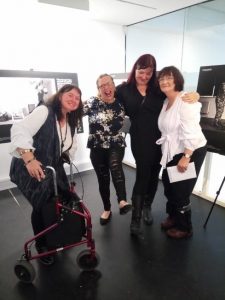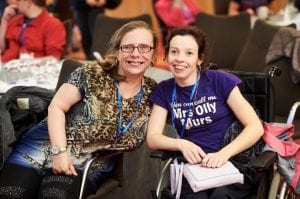People First (Scotland)
Case study
People First (Scotland) – Nothing about us, without us.
People First (Scotland) is a Disabled Persons’ User-Led Organisation that works for the human rights of people who have the labels of learning disability or intellectual impairment. The organisation is controlled by its members, who all have a learning disability. We campaign to establish and protect the same freedom, choice, dignity and control as other citizens across all areas of life. We have a Board of Directors and it is made up only of people with learning disabilities. We have over 60 groups and over 1000 members all over Scotland.
We work to change 3 things:
- The way people with learning disabilities see themselves – most of us have grown up believing that we are not much use, that we have nothing useful to say and that we can do nothing for ourselves or anyone else.
- The way the world sees and thinks about people with learning disabilities – most people in our communities believe that, at best, we are “poor souls” and, at worst, that we are a nuisance and a drain on society.
- The law and policy as it affects people with learning disabilities – our lives are often ruled and directed by laws and policies that we have had no say in. One of our mottos is “nothing about us without us”.
We are a collective self-advocacy organisation. Our work is to help people with learning disabilities feel empowered, equal and safe. We speak up about things that are important to us and try to help improve the lives of all people with learning disabilities in Scotland and beyond.
What we want:
- To have the same human rights as other people
- To choose where we live and who we live with
- To be free of discrimination and hate crime
- To have fair access to justice under the law
- To have relationships like other people
- To be able to get the support we need to raise a family
- To have proper jobs with decent wages
- To be included in mainstream education
- To be supported to make our own decisions
- To live our lives as equal citizens
Members meet together in local groups. We support each other and campaign for better lives for people with learning disabilities. We elect members to represent us on the Board of Directors and to sit on local and national planning groups. We work with Health and Social Care, Scottish Government, Police Scotland and other professionals to make our voices heard. We also link with People First groups in England, Wales and other countries.
Members say that they really grow in confidence by coming to our groups. They start to realise that they have a voice, and that their voice is important. They start to understand that they are people with rights.
One of the things that we campaign about, on a local and national level, is defending the rights of women with learning disabilities and making sure that women’s voices are heard.
Women’s voices:
We want tell you a bit about our experiences as women with learning disabilities.
It is not easy for us to have close personal relationships because, a lot of the time, we are not being treated like equal adults. Other people do not expect us to have or need real sexual relationships, or to get married and have children. We are not given the support and encouragement to develop relationships and there is a lack of opportunities to go out to places to meet people safely. Support services focus on physical health, to some extent, but do not help enough with things like safely making friends and having sexual relationships, which are important for emotional health.
One of our members said:
“We need to build up our confidence about relationships and for there to be higher expectations that people with learning difficulties will have relationships. After all it is our right.”
Because we do not get the chance to learn what friendships and relationships should be like, we become vulnerable to coercion and harm. Many women who have been to special schools said they had very little education or information on sexual health.
We know that there is not enough easy read information and education about bodies, sex and relationships.
One of our members said:
“We need to learn about sex and relationships and not be left out of stuff like this, which is what usually happens.”
Unless we have the chance to understand and talk about these things, we can find ourselves in situations where we do not have power and this can allow abuse to happen.
Some women have shared examples of deciding that they want a relationship and then getting involved with someone but keeping it secret. They are afraid they will be told they are not allowed to have a partner.
Some were letting the other person abuse them because they did not know that what they were doing was abuse.
Here is what she said:
“In the past I had boyfriends but they often threatened me. I don’t like being forced to do stuff. A partner should be protecting.”
Many women with learning disabilities have been abused by people who are supposed to be looking after them, like support workers or family members. Some women have said that in some cases, they tried to tell someone what has happened but they did not feel listened to or believed.
Most women have shared examples of having had a significant lack of control at some point in their lives. Some of us worry that if we speak up things may blow out of proportion and the situation may go outwith our control. This is because many of us have had bad experiences with Adult Support and Protection and Guardianship. We are afraid that if we show we are at risk then our right to make decisions about our life will be taken away from us. This fear of current Scottish laws impacting on our human rights, is one of the barriers we face to accessing the services we need when we are experiencing abuse.
The focus should be on teaching us how to be in control of our own lives instead of taking the control away from us. It should be understood that we should be allowed to make mistakes like other people and get the support to feel safe and to learn from our experiences. We should be able to get support to make informed decisions, not have our voice taken away. Like all women, we should have access to appropriate support services. We might need a bit more support than other women but we should have equal opportunity to feel safe.
Any information about abuse and organisations that can help would need to be available in an accessible format, like easy read. Professionals should also understand that they need to communicate with us in plain language and take the time to really listen.
It is important that you understand that we have a fear of our rights being taken away. We need support to understand our options and to make our own choices. We want more opportunities for education, relationship advice, counselling and clear legal advice. The focus should be about helping women to keep themselves safe.
We need support to build up our confidence so we can stand up for ourselves and make positive decisions.
Our work on women’s rights:
Members from different areas in Scotland have been involved in this work, representing not just their own views but also the collective lived – experience of the members in their local women’s groups.
Here is some of the work we have done in recent years:
- We have delivered training to Scottish Women’s Aid and Rape Crisis Scotland. The training covered learning disability awareness, communication skills and how to make services more accessible. We strongly believe that people with lived-experience should be part of the training offered to professionals and we try to share our lived-experience when we have the opportunity to do so.
- We participated in the Zero Tolerance ‘Violence Unseen’ campaign. Members of the Glasgow women’s group worked with photographer Alicia Bruce to produce photographs for the campaign. Edinburgh members also participated in a focus group looking at the poster design and content for the campaign.
- We contributed to the ‘Disabled Women: Our Bodies, Our Rights’ research and report by Engender. We sat on the steering group for the project and contributed our lived-experience to the research. It was actually a People First member who came up with the name ‘Our Bodies, Our Rights’ and then also spoke at the Engender at the research launch event.

- Members are actively involved in promoting cervical cancer screening across Scotland and encouraging women with learning disabilities to attend screenings.
- We have attended and presented at Health Scotland conferences on Gender Based Violence and learning disability. In the 2016 conference, one of our members did a keynote speech, while we also designed and delivered a workshop called “Women’s Voices”, in which we shared our lived-experience and the barriers we face in accessing services. Three of our members also represented our views in the most recent conference, in 2019.
- In 2019, we contributed to Scottish Government’s Equally Safe consultation and follow-up roundtable events. We contributed our views about how to make it easier for women (and other people) to access forensic medical examinations and the health care they need if they have been raped or sexually assaulted. Our contribution in this process influenced the content of the Forensic Medical Services (Victims of Sexual Offences) (Scotland) Bill.
- In early 2020, we offered feedback to Health Scotland on their Guidance for Professionals working with women with learning disabilities who have been the victims of Gender Based Violence.
- We also recently offered support to Scottish Government in creating an Easy Read accessible version of the policy memorandum to the Forensic Medical Services (Victims of Sexual Offences) (Scotland) Bill.
- We currently have plans on sharing our lived-experience with the Safe Lives team as part of the Whole Lives survey on support for survivors of domestic abuse.

Participating in this work is an empowering experience for us, as women with learning disabilities. We have seen the positive impact that our words and stories have on the people who attend our trainings and workshops. We have met many people who are open to listening and understanding our point of view. We have seen the impact that true co-production can make to research and policy-making.
However, there is a still a lot of work to be done to make sure that the voices of women (and all people) with a learning disability are kept to the forefront of policy and decisions that affect us. We want to be represented equally in decision-making forums and for our contribution to be invited more actively and more frequently. We say ‘Nothing about us, without us’ and by this we mean not just issues immediately relevant to learning disability but also issues that affect all citizens, all women. Sharing our lived-experience with the First Minister’s National Advisory Council on Women and Girls is a good opportunity to do this. We look forward to continuing this conversation in the future.
Contact us:
Email: admin@peoplefirstscotland.org
Visit our website: www.peoplefirstscotland.org
or find us on Facebook: People First Scotland